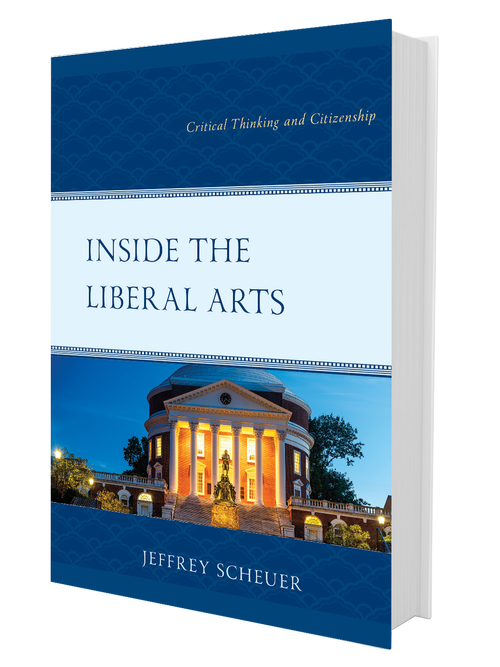Liberal Arts Equip Students With Critical Thinking Skills They Need Today
Imagine you’re a prospective student touring a liberal arts campus for the first time. You ask the admissions dean that perennial question: “What kind of job will I get after I graduate?” One answer is: maybe not one that is both immediate and well-paying.
But over time, as the dean might point out, the average liberal arts graduate earns as much as or more than a graduate from STEM (science, technology, engineering, math) disciplines. A 2014 study found that liberal arts majors earn more at their peak earning ages than those with professional or pre-professional academic backgrounds.
In a knowledge-based economy, a broad humanities education prepares students by giving them critical thinking and citizenship skills they need to adapt to a fast-changing world. This is why American business leaders, scholars, and educators at specialized schools such as culinary institutes and military academies insist that students gain the breadth and sophistication that only comes with exposure to the liberal arts.
Consider the United States Military Academy, where cadets are now exposed to liberal learning for the most practical of reasons: preparation for military leadership. Curricular reforms at West Point have included immersion in foreign cultures and languages, a more interdisciplinary approach focusing on “educational experiences that transfer learning from one context to another,” “collaborative reflection,” an emphasis on students’ “leadership and ethical decision-making capabilities under stress,” and the ability to “minimize the unintended second- and third-order consequences of their actions.” In other words, like all effective citizens, 21st-century soldiers must learn to see their own perspective as conditioned and limited. They must think in terms of causal and cultural contexts that span the sciences, social sciences, and humanities and adapt to unforeseen challenges.
Creativity, flexibility, and the ability to look beyond the surface for deeper patterns are all hallmarks of a liberal arts education, as is the humility to challenge our own beliefs and seek alternative viewpoints. Interaction among students and teachers demands tolerance, a balance of restraint and self-assertion, and eagerness to teach and to learn.
Liberal learning doesn’t aim primarily to inculcate practical skills or dump data into students’ brains. Rather, it promotes both domain-specific knowledge and the intellectual skills of critical thinking. These include developing:
- Habits of curiosity and questioning — Questions don’t arise out of anywhere or pop into our minds randomly; they arise from doubt, curiosity, uncertainty, and our vast stores of ignorance. They arise, that is, in a particular context, as part of some larger fabric of inquiry.
- Openness to diverse perspectives — Like all institutions, schools consist of individuals who share an ostensible common purpose but also have diverse backgrounds, roles, and aims. Wherever there is such potential for conflict, among individuals or between individuals and the institution, there is a moral community. Unlike hospitals, prisons, or military organizations, however, colleges and universities are also laboratories of democratic life. They are intentional communities, each having a particular institutional character, focus, traditions, and student body.
- Capacity for seeing relationships, patterns, and systems — Liberal arts teach students to think about systems, the connections within them, and their relationship to other systems and the greater whole.
- An appetite for analyzing things in terms of their constituent parts and their connections to other things and to larger wholes, and the ability to judge when it’s time to stop analyzing and act.
Critical thinkers tolerate uncertainty, ambiguity, complexity, and divergent values while also looking for usable truths, workable consensus, deeper understanding, and clearer communication.
Education of any kind does more than just serve the individual student. It serves the nation and the world by fostering economic, civic, and cultural prosperity — maximizing human capital — and correlatively diminishing poverty, isolation, ignorance, and fear, with all their attendant costs.
A democratic society needs citizens at every level who are critical thinkers. You say you want to drop out and start a software firm or a hedge fund. Go ahead. But read “Moby-Dick,” “Huckleberry Finn,” or “The Great Gatsby,” and you will understand the United States, and maybe even yourself, a little better.
The Danger of Ditching Liberal Arts in High-Tech Times(Opens in a new browser tab)
About the Author: Acclaimed author and freelance writer Jeffrey Scheuer has published essays, articles, reviews, and commentary in The New York Times, The Washington Post, and some two dozen other daily newspapers and publications, including Dissent, The Fletcher Forum of World Affairs,, Gettysburg Review, Potomac Review, Wilson Quarterly, Nieman Reports, and Philosophy Now. His new book “Inside the Liberal Arts: Critical Thinking and Citizenship” is the only book to systematically relate the liberal arts to thinking rationally and critically. He is also the author of “The Big Picture: Why Democracies Need Journalistic Excellence” (2007) and “The Sound Bite Society” (1999), named a Choice “Outstanding Academic Title.” Learn more at JeffreyScheuer.com.
By Jeffrey Scheuer
